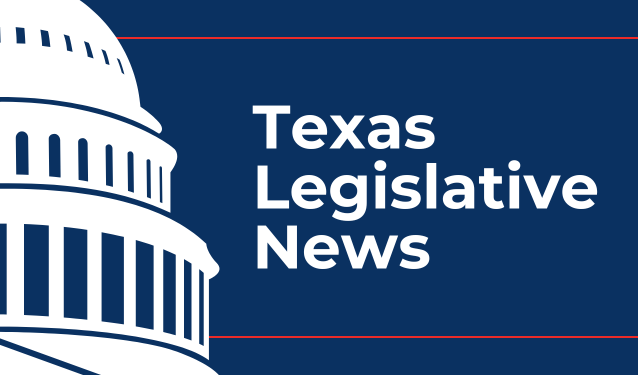

Table of Contents
Welcome to the latest edition of Texas Legislative News for the 89th Texas Legislature. In this regular feature, we provide information on disability-related issues and bills under consideration at the State Capitol. We also explain how lawmakers conduct business, and we share details on upcoming TCDD events.
The legislative session’s final days always come with a burst of activity. Some bills pass, many bills fail, and the occasional proposal is saved by being amended into another measure. Sorting through the results to get a clear picture of where things wound up takes a little time.
With the Legislature now adjourned sine die, we’re reviewing the outcomes of efforts to address disability-related issues. This week, the focus is on accessibility.
What Did Lawmakers Do About Accessibility?
TCDD adopted the following public policy priority on accessibility for the legislative session: Raise accessibility standards in Texas to promote community inclusion and ensure equal access. Texans with disabilities deserve to live in communities which are accessible to them in all aspects of their lives, including meeting basic needs in places outside of the home and utilizing the various modes of transportation.
While accessibility-related bills were largely unsuccessful this session, here are some of the proposed measures we tracked that related to this priority.
Accessible Transportation
Transportation is “essential to quality of life and integration into the community and must meet the needs of individuals with disabilities in a safe, reliable, convenient, affordable, timely, and accessible manner,” according to TCDD’s position statements.
This session, lawmakers filed a variety of bills that would have improved the ability of people with disabilities to get to and from the places they work, socialize, worship, attend school, and access health care and other vital services. Some bills of note, all of which failed to pass in the Senate, included:
- House Bill (HB) 1136, by Rep. Erin Gámez, would have required the Texas Governor’s Committee on People with Disabilities and other state agencies to study the current and future parking needs of Texans with disabilities, including disabled veterans and people with mobility-related disabilities.
- HB 1936, by Rep. David Cook, would have strengthened enforcement of accessible parking violations. This bill was featured as a TCDD Bill of the Week.
- HB 3947, by Rep. Yvonne Davis, would have required metropolitan planning organizations to consider the transportation needs of people with disabilities when developing their 10-year plans. This bill was featured as a TCDD Bill of the Week.
- Senate Bill (SB) 159, by Sen. José Menéndez, would have required San Antonio’s mass transit authority to establish an education and training program for public transportation vehicle operators on interacting with and supporting people with intellectual and developmental disabilities (IDD).
- SB 1770, by Sen. Molly Cook, would have required the Texas Transportation Commission to adopt a “complete streets policy” to provide guidelines for the safety, accessibility, and mobility of users of streets and highways — including pedestrians, bicyclists, people with disabilities, children, older adults, public transportation users, movers of commercial goods, and motorists — in the planning, design, construction, and maintenance of streets and highways.
Accessible and Affordable Housing
TCDD supports the position that all people with IDD have the right to safe, accessible, affordable, and integrated housing. Unfortunately, renters with disabilities often face higher rates of eviction and housing denial as well as refusals to allow modifications to accommodate their needs. Homeowners with disabilities often find themselves priced out of their homes due to the difficulty of affording property tax increases on fixed, limited incomes.
Measures to address the housing needs of people with disabilities were generally unsuccessful this session. Some notable bills that failed to pass include:
- HB 697, by Rep. Armando Walle, would have allowed municipalities or counties to ban housing discrimination against older adults and people with disabilities based on the lawful source of their rental income, such as Section 8 housing vouchers.
- HB 972 and House Joint Resolution 72, by Rep. Candy Noble, would have proposed a constitutional amendment reducing the property tax burden for people who own homes that are used as primary residences for adult family members with IDD.
- HB 1063, by Rep. Salman Bhojani, would have allowed local governments to create legal service offices to assist low-income tenants with disabilities in cases based on housing discrimination. This bill was featured as a TCDD Bill of the Week.
- SB 1802, by Sen. Carol Alvarado, would have expanded tenant protections by clarifying landlords’ liability for the maintenance of accessible routes to, from, or inside tenants’ living spaces.
Service and Therapy Animals
The Americans with Disabilities Act (ADA) defines service animals as animals, typically dogs, “that are individually trained to do work or perform tasks for people with disabilities.” Service animals are working animals, not pets. The work or tasks a service animal is trained to provide must be directly related to their owner’s disability.
Therapy animals are not recognized by the ADA. They are defined by the American Veterinary Medical Association to include trained animals of various species that participate in animal-assisted interventions such as animal assisted therapy, education, and activities.
The legislative session saw two notable bills that would have clarified regulations on service animals and therapy animals, but neither of these bills received committee hearings:
- HB 4563 by Rep. Lulu Flores, would have allowed therapy dogs to accompany people with disabilities during testimony in criminal cases.
- HB 4758 by Rep. Caroline Harris Davila, would have allowed school districts to adopt policies allowing service-animal handlers to accompany students with service animals.
Universal Changing Stations
There are many people with disabilities and medical conditions who do not have access to safe, private, and dignified places to use public restrooms, according to the Changing Spaces Campaign. Baby changing tables are too small for older children and adults. But universal changing stations are designed to accommodate everyone. To address this issue, states such as Ohio and Tennessee have taken action to expand access to universal changing stations.
In Texas, lawmakers filed bills that would require public buildings and certain places of public accommodation to provide access to universal changing facilities. But neither HB 4754 by Rep. Ray Lopez nor SB 2326 by Sen. Judith Zaffirini received public hearings this session.
TCDD Advocacy Survey
As the 89th legislative session ends, we’re gathering feedback on the information and resources we offered to keep you informed and engaged with business happening at the Capitol. Please take our short survey to share your input and help us plan our future advocacy activities.
Join TCDD for a Capitol Recap on Disability Policy
On Wednesday, June 25, TCDD will host a Disability Policy Academy titled “A Capitol Recap: Disability Policy in the 89th Legislature.” The free event is open to the public and will feature:
- an overview of new disability-related laws;
- a summary of disability issues that remain unaddressed;
- a discussion on topics lawmakers may cover in the legislative interim; and
- a Q&A session with TCDD’s public policy analysts and other disability advocates.
Participating organizations include the Autism Society of Texas, the Coalition of Texans with Disabilities, Texas Advocates, and Texas Parent to Parent.
The event will be held via Zoom. Participants must register ahead of time to attend. TCDD will provide Communication Access Real-time Translation (CART) service. If you need other accommodations to participate, please indicate that when registering and email Koren Vogel or call her at 512-948-2035.
Date: Wednesday, June 25
Time: 1-2:30 p.m. Central Time
Stay Informed
Stay up to date on how lawmakers address disability issues by following us on Facebook, X, Instagram, and LinkedIn. You can also check out our Policy section to learn more about our legislative engagement and find resources to support your own advocacy.
